News Archive
Filter by Division
Filter by Categories
Science with Purpose: Dr. Jie Luo’s Work to Improve Prostate Cancer Treatment
February 13, 2026 / Faculty SpotlightTargeting a metabolite as a therapy for childhood ependymomas
February 4, 2026 / Experimental PathologyA new study published in Nature by Dr. Sriram Venneti’s laboratory at the University of Michigan’s Department of Pathology and the Chad Carr Pediatric Brain Tumor Center has identified a surprising driver of ependymoma growth: a molecule called itaconate. The discovery opens the door to new therapeutic strategies for this aggressive childhood cancer.
Kleer Lab Receives Dynami Foundation Donation
January 30, 2026 / Experimental PathologyDr. Celina Kleer, Harold A. Oberman Collegiate Professor of Pathology, received a generous donation from The Dynami Foundation to study invasive lobular carcinoma of the breast. The Dynami Foundation recognized Dr. Kleer as an exceptional breast cancer researcher with over 20 years of experience.
From Health Lab: Additional testing can improve kidney cancer diagnosis
October 30, 2025 / MctpA study from the University of Michigan Health Rogel Cancer Center and Department of Pathology shows that further testing in renal cell carcinoma with an overexpression of gene TRIM63 could uncover a mutation otherwise undetected, leading to more treatment options for patients.
Lanbo Xiao, PhD: Research Faculty Recognition Award
October 28, 2025 / AwardDr. Lanbo Xiao, a research assistant professor in the Center for Translational Pathology, received a 2025 Faculty Award in recognition of his exceptional contributions to cancer research, teaching, and service. His pioneering work in chromatin remodeling and epigenetic regulation has led to new insights in cancer therapy and significant advances in public health diagnostics.
Dr. Analisa DiFeo Receives 2025 MICHR Distinguished Clinical and Translational Research Mentor Award
September 15, 2025 / AwardFDA Approves First-Ever Drug for a Rare and Aggressive Brain Cancer
August 13, 2025 / ResearchResearch from Sriram Venneti, MD, PhD and Carl Koschmann, MD led to FDA approval of a drug treatment for diffuse midline glioma.
From Health Lab: Study reveals mechanisms behind common mutation and prostate cancer
July 24, 2025 / ResearchStudy reveals mechanisms behind common mutation and prostate cancer. Researchers discovered two distinct ways mutation of the FOXA1 gene alters tumor formation and therapy resistance in prostate cancer in mouse models.
Vennetti Lab Offers a Flicker of Hope for Parents of Pediatric Cancer Patients
July 1, 2025 / Experimental PathologyOne of the most heartbreaking things a parent can hear is “Your child has an aggressive, malignant brain tumor.” When that is followed up with the physician saying there is no effective cure, parents are left devastated. This is what motivates Dr. Sriram Venneti and his research laboratory to dedicate their all to finding a cure. Venneti focuses on Group 3 medulloblastomas, which are very aggressive pediatric brain tumors with no known cure.
Resilience, Discipline, Focus, and Relentless Hard Work
June 25, 2025 / Experimental PathologyThe Keys to Dr. Analisa DiFeo's Success
DiFeo Lab Undergraduate, Harini Ram, named 2025 Astronaut Scholar
June 10, 2025 / AwardIn the Department of Pathology, we have scholars at all levels working in our laboratories. One of these, undergraduate Harini Ram, was recently recognized as the recipient of the 2025 Astronaut Scholarship, the only one to receive this scholarship from the University of Michigan this year, and only the 18th in the history of this award. According to the Astronaut Scholarship Foundation, this award is presented to students in their junior or senior year of college who are pursuing a STEM field (science, technology, engineering, or mathematics) with the intention of conducting research or advancing their field upon completion of their final degree. These scholars represent the “best and brightest minds in STEM who show initiative, creativity, and excellence in their chosen field,” reports the Astronaut Scholarship Foundation.
Dr. Abhijit Parolia - A Rising Scholar
March 21, 2025 / Experimental PathologyOn Thursday, March 20th, the National Institutes of Health, National Cancer Institute presented its Rising Scholars Lecture with pathology’s Dr. Abhijit Parolia, assistant professor of experimental pathology, entitled NSD2 is a requisite subunit of the AR/FOXA1 neo-enhanceosome in promoting prostate tumorigenesis. Rising Scholar lectures showcase NCI-supported early career researchers with outstanding research findings.
Organoid model predicts bladder cancer treatment response
September 20, 2024 / Anatomic PathologyPersonalized medicine utilizes an individual’s genetic and genomic make up to treat and prevent diseases. The promise of personalized medicine continues to grow as new scientific discoveries uncover previously unknown features and drug sensitivities for tumors. In a recent study, Dr. Aaron Udager, associate professor of genitourinary pathology and co-director of our PSTP program, was co-senior author on a publication with Dr. Sofia Merajver, professor of epidemiology and internal medicine and the director of the breast and ovarian cancer risk evaluation program.
Researchers identify factor that drives prostate cancer-causing genes
September 10, 2024 / FacultyResearchers at the University of Michigan Health Rogel Cancer Center have uncovered a key reason why a typically normal protein goes awry and fuels cancer.
They found the protein NSD2 alters the function of the androgen receptor, an important regulator of normal prostate development. When androgen receptor binds with NSD2, it causes rapid cell division and growth leading to prostate cancer. The study, published in Nature Genetics, may suggest a new way to therapeutically target prostate cancer. The findings illuminate a phenomenon not previously understood.
And the 2023 Best Paper Award goes to...
September 3, 2024 / AwardDr. Rohit Mehra, Professor and member of the Michigan Center for Translational Pathology (MCTP), and his international team of collaborators were recently recognized by the Asian Journal of Urology for the best paper published in their journal in 2023. This award-winning study is a literature overview of chromophobe renal cell carcinoma (ChRCC), the third most common RCC subtype.
Research Finds Possible Therapies to Target Oncogenic Transcription Factors in Multiple Cancer Types
July 25, 2024 / PublicationsA study from the University of Michigan Health Rogel Cancer Center furthers research that suggests the potential of developing new cancer treatments to target oncogenic transcription factors by indirectly affecting their ability to access enhancer DNA in chromatin.
The findings appear in Cancer Cell.
Led by Arul Chinnaiyan, M.D., Ph.D., S.P. Hicks Professor of Pathology and director of the Michigan Center for Translational Pathology at Michigan Medicine, the research builds on previous work to find genetic vulnerabilities to treat transcription factor-driven cancers like prostate cancer.
Researchers find common immune system mechanism between pregnancy, cancer
July 8, 2024 / PublicationsTo understand why some cancers successfully circumvent the immune system to grow unchecked, researchers turned to pregnancy.
 “In pregnancy, the immune system does not reject the growing fetus, so we know there must be mechanisms active in the placenta. In cancer, it’s the same thing: the growing tumor is not rejected by the immune system. It means the cancer cells have developed strategies to suppress immune rejection, same as in pregnancy,” said Weiping Zou, M.D., Ph.D., professor of experimental pathology.
“In pregnancy, the immune system does not reject the growing fetus, so we know there must be mechanisms active in the placenta. In cancer, it’s the same thing: the growing tumor is not rejected by the immune system. It means the cancer cells have developed strategies to suppress immune rejection, same as in pregnancy,” said Weiping Zou, M.D., Ph.D., professor of experimental pathology.
It’s a good thing in pregnancy – it allows the baby to grow. But in cancer, it means the tumor grows unchecked and treatments meant to stimulate an immune response are not effective.
Dr. Analisa DiFeo named 2024 Rogel Scholar
July 3, 2024 / AwardDepartment of Pathology faculty member, Analisa DiFeo, PhD, has been named a 2024 Rogel Scholar by Michigan Medicine. The award supports exceptional faculty dedicated to achieving impact on cancer prevention, patient outcomes, and quality of life. Please join us in congratulating Dr. Analisa DiFeo on this prestigious award!
Engineering Hope
June 18, 2024 / Faculty SpotlightDr. Matthew Iyer's Transformation from Programmer to Pioneering Cancer Researcher
AP-funded Grant Leads to Human Pathology Cover Story
June 11, 2024 / Anatomic PathologyThe Division of Anatomic Pathology in the Michigan Medicine Department of Pathology offers grant funding for faculty and trainees to pursue research interests related to anatomic pathology that may not otherwise be funded. One of these internal AP grant-funded projects, led by first-author Eman Abdulfatah, MD and senior-author Rohit Mehra, MD, resulted in a recent cover story in Human Pathology entitled “Extragonadal germ cell tumors: A clinicopathologic study with emphasis on molecular features, clinical outcomes and associated secondary malignancies.”
Development and Validation of an 18-Gene Urine Test for High-Grade Prostate Cancer
May 13, 2024 / Experimental PathologyIn a manuscript published this week in JAMA Oncology, senior author Dr. Arul Chinnaiyan and members of the EDRN-PCA3 Study Group reported on their development and validation of a new 18-gene urine-based test for diagnosis of high-grade prostate cancer, MPS2. This test was initially developed in the Department of Pathology.
With $5M Grant, Rogel Team Will Conduct Preclinical Work to Develop Drugs Targeting Cancer Master Regulator
May 8, 2024 / MctpUniversity of Michigan Rogel Cancer Center researcher Arul Chinnaiyan, MD, PhD, has received a $5 million grant from the J.C. Kennedy Foundation to conduct laboratory tests of a potential drug candidate targeting a master regulator that controls the majority of genes involved in the most challenging type of prostate cancer. The SWI/SNF chromatin remodeling complex was previously found to facilitate access to enhancers that oncogenes can bind to, driving downstream gene expression in cancer. Degrading a subunit of this complex blocks the oncogenes [...]
Rita A. Avelar, PhD Receives Women in Cancer Research Scholar Award
April 9, 2024 / AwardThe American Association for Cancer Research recently released their 2024 Women in Cancer Research Scholar Awards and Rita A. Avelar, PhD, Postdoctoral Fellow in the DiFeo Laboratory, was one of just twelve women scholars awarded. This award is presented to early-career, meritorious female scientists at the AACR Annual Meeting, which will be held April 5-10, 2024, at the San Diego Convention Center in San Diego, California.
MCP Graduate Student Joanna Lum Receives ChadTough Defeat DIPG Foundation Fellowship Award
January 18, 2024 / Experimental PathologyIn the world of research and grant funding, it is easy to lose sight of the effort required for foundations to provide funding to researchers and the underlying motivation for that funding. This is not the case, however, for Molecular and Cellular Pathology Graduate Student Joanna Lum. Lum was recently awarded the ChadTough Defeat DIPG Foundation Fellowship Award, providing her with $200,000 over 3 years to study Diffuse Intrinsic Pontine Glioma, the deadliest form of pediatric brain cancer. DIPG is a brainstem glioma most commonly affecting children ages 5-9 years old. More than 90% of these children will die within 1.5 years. The DIPG foundation was created by two families who lost their sons to DIPG.
Career Conversations: Analisa DiFeo, PhD
November 30, 2023 / Careers In PathologyS1, EP6
Dr. Analisa Difeo, PhD drops by The Path Report, to discuss how she became interested in medicine, the work her lab is doing, and more!
Faculty Recognition: Congratulations!
November 14, 2023 / AwardMultiple Department of Pathology faculty members have recently been recognized for their achievements and nominated to leadership roles for their excellence within their respective fields. These members continue to demonstrate the depth of our department's knowledge and research.
Study brings insight to kidney cancer with gene mutation
August 8, 2023 / Experimental PathologyA study from clinicians and researchers at the University of Michigan Rogel Cancer Center, U-M Department of Pathology and the Michigan Center for Translational Pathology reveals findings from over 800 clinical assays performed for kidney patients with MiTF family gene mutations.
Dr. Arul Chinnaiyan Recognized for Outstanding Achievement in Pathology
June 28, 2023 / Experimental PathologyDr. Arul Chinnaiyan, S. P. Hicks Endowed Professor of Pathology and Professor of Urology at Michigan Medicine Department of Pathology and Director of the Michigan Center for Translational Pathology, was recently recognized for his outstanding achievements by the American Association of Cancer Research. He was presented with the AACR James S. Ewing-Thelma B. Dunn Award for Outstanding Achievement in Pathology in Cancer Research award at the 2023 AACR Annual Meeting. Please join us in congratulating Dr. Arul Chinnaiyan for this well-deserved prestigious honor!
Medical School Honors Faculty with Named Professorships in 2022
March 20, 2023 / AwardCongratulations to the Department of Pathology faculty who were honored on Thursday, March 16th by the Medical School for being appointed to named professorships in 2022. This included Dr. Ulysses G. J. Balis, Director of Pathology Informatics, who was honored for his appointment as the A. James French Professor in Pathology Informatics, and Dr. Jolanta Grembecka, who was honored for her appointment as the Richard and Susan Rogel Professor in Cancer Therapeutics. Balis and Grembecka were among 51 Medical School faculty members honored [...]
Rogel Researchers Receive $4M Through Prostate Cancer Foundations Inaugural TACTICAL Awards Program
January 10, 2023 / AwardThe University of Michigan Rogel Cancer Center researchers received one of the Prostate Cancer Foundation’s four inaugural Class of 2022 TACTICAL (Therapy ACceleration To Intercept Cancer Lethality) Award. This $30 million program will support cross-disciplinary pioneering research toward the goal of developing 21st Century therapies for the most life-threatening form of prostate cancer [...]
Ryan Lab Makes Unexpected Discovery in B-cell Acute Lymphoblastic Leukemia
January 10, 2023 / Experimental PathologyOne of the most fascinating aspects of a career in cancer research is that one never knows when or where the next great discovery will occur. This was true of a recent breakthrough discovery made by the Dr. Russell Ryan laboratory at the University of Michigan Medical School. They were shocked to find that active regulatory elements in B-ALL contained not only typical protein binding sequences but also simple repeats of the sequence “GGAA”, usually considered a form of “junk DNA” with no regulatory function [...]
Clear Cell Renal Cell Carcinoma study results published
January 6, 2023 / Experimental PathologyMembers of the University of Michigan Department of Pathology and Michigan Center for Translational Pathology, in collaboration with the Clinical Proteomic Tumor Analysis Consortium, recently published a large study on clear cell renal cell carcinomas (ccRCCs), which represent about 75% of the RCC cases and account for the most RCC-associated deaths. This study set out to create a comprehensive profile of ccRCC, combining histologic and molecular profiles. By analyzing both the microscopic cell structures and the genetic makeup of the cells, these researchers discovered significant intratumoral heterogeneity in 90% of ccRCCs. This indicates that ccRCCs originate from multiple tumor cell lines, called tumor subclones, that may become metastatic and could independently influence response to therapies. Through this study, the team was able to molecularly stratify aggressive histopathic subtypes, which may lead to more effective treatment strategies for patients and improved survival.
Cytomorphology and IHC helps diagnose transformed metastatic prostate cancer
October 27, 2022 / Experimental PathologyA research team from the Michigan Center for Translational Pathology undertook a study to illustrate how careful assessment of cytologic and biomarker features may provide physicians with information on Metastatic Prostatic Cancer (MCP) patients’ prognosis and the best therapies to consider [...]
A new cooperation between EZH2 and p38 proteins enhances metastasis in triple negative breast cancer
August 17, 2022 / Experimental PathologyThe Celina Kleer lab at the University of Michigan Department of Pathology and Rogel Cancer Center has found a new mechanism that fuels metastasis in triple negative breast cancers. In their new study they show that EZH2, a master regulator of cell type identity, known to function through methylation of histones, has a new, unexpected function in aggressive breast cancers [...]
Dr. Sriram Venneti named Scientific Research Director
July 1, 2022 / AnnouncementEffective July 1, 2022, Dr. Sriram Venneti, Professor of Pathology, was appointed as Scientific Research Director and Dr. Carl Koschmann, Assistant Professor of Pediatrics, was appointed as Clinical Research Director for the Chad Carr Pediatric Brain Tumor Center (CC-PBTC).
Congratulations to Dr. Jolanta Grembecka on being named the inaugural Richard and Susan Rogel Professor in Cancer Therapeutics
June 27, 2022 / AnnouncementWe recognize Dr. Jolanta Grembecka on being named the inaugural Richard and Susan Rogel Professor of Cancer Therapeutics. An induction ceremony will be held later this year. Please join us in congratulating her on this honor!
Qualitative Image Analysis study shows excellent results
June 9, 2022 / Anatomic PathologyA landmark study into quantitative image analysis in ER, PgR, and HER2 in invasive breast carcinoma was recently published in the American Journal of Clinical Pathology. Dr. Mustafa Yousif, Assistant Professor of Breast Pathology and Informatics, and colleagues conducted a retrospective study of 1,367 invasive breast carcinomas of all histopathology subtypes, for which ER, PgR, and HER2 were analyzed by manual scoring [...]
Fun in the Sun...and Skin Cancer Risk
June 3, 2022 / Anatomic PathologyWhat is skin cancer and how can you prevent it?
Using Artificial Intelligence to predict ERG Gene Fusion in Prostate Cancer
May 10, 2022 / Experimental PathologyThe role of artificial intelligence (AI) in healthcare continues to expand. In a recent issue of BMC Cancer, Dr. Vipulkumar Dadhania (first author) and colleagues published a result of their study Leveraging artificial intelligence to predict ERG gene fusion status in prostate cancer. The expert team from the Michigan Center for Translational Pathology developed a deep-learning-based model to predict ERG genomic rearrangements in prostatic adenocarcinomas using only H&E-stained digital slides [...]
Parolia Selected For Harold Weintraub Graduate Student Award
March 1, 2022 / Experimental PathologyPlease join us in congratulating Dr. Abhijit Parolia on being selected for the 2022 Harold Weintraub Graduate Student Award. The award, established by the Fred Hutchinson Cancer Research Center, is given yearly and recognizes outstanding achievement during graduate studies in the biological sciences [...]
Arul Chinnaiyan, MD, PhD, selected for the Sjöberg Prize in Cancer Research
February 11, 2022 / AwardThe Royal Swedish Academy of Sciences, which also awards the Nobel Prizes, announced today that Arul Chinnaiyan, MD, PhD, S.P. Hicks Professor of Pathology and Urology at Michigan Medicine and Director of the Michigan Center for Translational Pathology, has been selected as [...]
Research from INHERET Published in JNCCN
January 18, 2022 / PublicationsResearch from INHERET was just published in the Journal of the National Comprehensive Cancer Network (JNCCN). Learn more about this study, which analyzes the implementation of InheRET's online tool that provides information about family history as it relates to cancer risks [...]
Research Study Published in European Urology's Open Science
January 5, 2022 / PublicationsA multi-institutional study led by Drs. Alex Taylor, Noah Brown and Rohit Mehra from the Department of Pathology was just published in European Urology's Open Science. Learn more about the resarch, which focuses on how TERT promoter mutations were characterized in urinary tract lesions, which may be considered as precursors to neoplasia at this site [...]
Study Demonstrates a Novel Approach to Target Enhancer-Addicted Cancers
January 4, 2022 / VideoA chromatin degrader stops transcription factors from driving cancer, which may serve as a potential treatment approach for over 90% of prostate cancers.
The Link Between Dysplastic Squamous Cells and Merkel Cell Carcinoma (MCC)
October 15, 2021 / Clinical PathologyResearch pertaining to Merkel cell carcinoma (MCC) and cutaneous neuroendocrine carcinomas was just published in the latest edition of Modern Pathology. Led by the team of Drs. Paul Harms, May Chan, Aaron Udager, Rajiv Patel, and more [...]
Repurposing an anti-diabetic drug to reverse aberrant epigenetic pathways in childhood ependymomas.
October 7, 2021 / Experimental PathologyMetformin holds promise against a rare type of childhood brain tumor in laboratory studies, as per an international team of researchers led by Dr. Sriram Venneti report in Science Translational Medicine. [...]
Multi-Institutional Study Published on GI Adenomatoid Tumors
October 6, 2021 / Clinical PathologyResearch from experts in the Department of Pathology was published in Europe PMC's Histopathology. The team comprised of Drs. Jiaqi Shi, Laura Lamps and Erika Hissong examined the impact of adenomatoid tumors within the gastrointestinal tract [...]
TRIM63 - What is it? (Hint: Not a weight-loss product)
August 9, 2021 / PublicationsDr. Xiao-Ming (Mindy) Wang and colleagues from the Michigan Center for Translational Pathology and Department of Pathology published a groundbreaking finding from an inter-institutional study regarding TRIM63 in Modern Pathology [...]
Researchers Uncover Way to Harness the Power of Immunotherapy for Advanced Prostate Cancer
August 3, 2021 / BlogFindings offer clues to why some types of renal cell carcinoma respond to immunotherapy while others do not — it’s a scientific riddle tangled up in a complex web. How do you turn an immune cold cancer into one that responds to immunotherapy?
Researchers Develop First Inhibitors Against Key Epigenetic Complex Involved in Cancer
June 21, 2021 / ResearchActivity of the polycomb repressive complex 1 is essential for the development and maintenance of leukemic cells; disrupting it presents a new potential therapeutic approach. Leukemia stem cells are rare cells that can renew themselves while continuing to generate malignant cells known as leukemic blasts. These cells are difficult to eradicate using chemotherapy drugs and frequently lead to recurrence of leukemia [...]
Research Published in Urologic Oncology's ScienceDirect
June 10, 2021 / Clinical PathologyResearch by Drs. Alexander Taylor and Stephanie Skala seek to understand why tumors masquerade as forms of type-2 papillary of renal cell carcinoma. The study was just published in Urologic Oncology's ScienceDirect [...]
Analysis Reveals How Kidney Cancer Develops and Responds to Treatment
June 10, 2021 / MctpNot all kidney cancers behave the same, with wildly different responses to immunotherapy or other treatments – and wildly different outcomes for patients as a result. By sequencing the RNA of individual cells within multiple benign and cancerous kidney tumors, researchers from the University of Michigan Rogel Cancer Center have identified the cells [...]
Researchers Develop First-in-Class Inhibitors Against Key Leukemia Protein
May 17, 2021 / Michigan Health BlogA research effort by Drs. Jolanta Grembecka and Tomasz Cierpicki was just published in Nature Communications. Learn more about the protein made by the ASH1L gene, which plays a key role in the development of acute leukemia, along with other diseases [...]
Research from Lombard Lab Published in Journal of Clinical Investigation
May 12, 2021 / PublicationsResearch from the Department's Lombard Lab was just published in the Journal of Clinical Investigation. The study, which focuses on how the deacylase SIRT5 compound supports melanoma viability by influencing chromatin dynamics, was led by Dr. Lombard [...]
Study Suggests Path to Blocking Common Genetic Driver of Lung Cancer
May 12, 2021 / MctpStopping the interaction between KRAS and the protein AGO2 slowed tumor growth in mouse models.
Arul Chinnaiyan, MD, PhD, Recognized for Outstanding Research
May 7, 2021 / AwardCongratulations to Arul Chinnaiyan, MD, PhD, who was announced as the Science of Oncology Award and Lecture recipient by the American Society of Clinical Oncology (ASCO). As part of this award, Chinnaiyan will present a 30-minute lecture entitled “Exploring Precision Oncology: from Gene Fusions to Related Genetic Drivers“ at the ASCO Annual Meeting, to be held virtually on June 4-8, 2021 [...]
Arul Chinnaiyan, MD, PhD Recognized for Outstanding Research
May 3, 2021 / AwardCongratulations to Arul Chinnaiyan, MD, PhD, who was announced as the Science of Oncology Award and Lecture recipient by the American Society of Clinical Oncology (ASCO). As part of this award, Chinnaiyan will present a 30-minute lecture entitled “ “ at the ASCO Annual Meeting, to be held virtually on June 4-8, 2021.
Research by Dr. Cho Published in AACR's "Cancer Research"
April 19, 2021 / Clinical PathologyA new publication from the Department of Pathology, led by Dr. Kathleen Cho, was just published in the American Association for Cancer Research's flagship journal. highlights how altering the microbiome within a mouse model of oviductal high-grade serious carcinoma can inhibit tumorigeneis [...]
Biomarker Could Help Identify Difficult-to-Diagnose Kidney Cancer Subtype
April 14, 2021 / PublicationsMiTF renal cell carcinoma can masquerade as other subtypes and may not respond as well to front-line therapies.
New Assay For Early Detection of Aggressive Prostate Cancers Developed
April 13, 2021 / Clinical PathologyA new study, led by U-M graduate in molecular and cellular pathology Dr. Andi Cani, was just published in European Urology Oncology. The publication focuses on the development of a whole-urine, multiplexed, next-generation RNA-sequencing assay that is used for the early detection of aggressive forms of prostate cancer [...]
"A Correct Diagnosis Can Be Life-Changing": Dr. Rohit Mehra
March 9, 2021 / VideoDr. Mehra discusses his career path and how he arrived at Michigan Medicine in our latest Careers in Pathology video.
Prognostic Subgroups of Merkel Cell Carcinoma Defined
February 9, 2021 / PublicationsA collaboration between the Department of Pathology and the Department of Dermatology examined biomarkers of outcomes in 346 cases of Merkel cell carcinoma (MCC), an aggressive type of skin cancer. The study was published in the recent edition of Clinical Cancer Research [...]
The multi-faceted role of the SUV family of H3K9 methyltransferases
February 8, 2021 / Clinical PathologyA new study from Drs. Andrew Muntean and Nirmalya Saha of the Department of Pathology's Muntean Lab was just published in Biochim et Biophysica (BBA) Reviews on Cancer. The research project sheds light on the multi-faceted role of the SUV family of H3K9 methyltransferases in carcinogenesis and within cancer progression.
Research from Dr. Udager Published in European Urology
February 1, 2021 / PublicationsA new publication, generated by Department of Pathology faculty members Drs. Aaron Udager and Scott Tomlins was successfully published in European Urology. The research highlights a longitudinal cohort study centered around the serial molecular profiling of low-grade prostate cancer in order to better assess tumor upgrading [...]
Study Explains Why Patients with Cancer Spread to the Liver Have Worse Outcomes
January 5, 2021 / Experimental PathologyA new study by the University of Michigan's Rogel Cancer Center analyzed patients with cancer and the factors that cause the cancer to spread to the liver, leading to worse outcomes.
Prostate Cancer Regulator Plays Role in COVID-19, Providing a Promising Treatment Lead
December 22, 2020 / Michigan Health BlogClinical trials underway are testing whether drugs that target the androgen receptor – successful in controlling prostate cancer – could also work against the coronavirus. wo proteins, ACE2 and TMPRSS2, help the coronavirus gain entry and replicate within cells. TMPRSS2 is well-known to Arul Chinnaiyan, MD, PhD. His lab discovered that TMPRSS2 fuses with the ETS gene to drive more than half of all prostate cancers [...]
Research Led by Drs. Cierpicki and Grembecka Published in "Blood"
December 2, 2020 / Clinical PathologyA new study led by Drs. Jolanta Grembecka and Tomasz Cierpicki of the Department of Pathology was just published in Blood's American Society of Hematology. The research focuses on combinatorial treatment with menin and FLT3 and how inhibitors induce complete remission in acute myeloid leukemia (AML) with activating FLT3 mutations [...]
Dr. Thomas Giordano wins the AACR 2020 Team Science Award
November 30, 2020 / Experimental PathologyCongratulations to Dr. Thomas Giordano and the entire Cancer Genome Atlas Project team for winning the American Association of Cancer Research's 2020 Team Science Award [...]
Dr. Celina Kleer Wins ASIP 2020 Outstanding Investigator Award
November 12, 2020 / Experimental PathologyCongratulations to Dr. Celina Kleer who was awarded the American Society for Investigative Pathology (ASIP)'s 2020 Outstanding Investigator Award. Dr. Kleer receives the award for her demonstrated excellence in research in experimental pathology [...]
Understanding Breast Cancer: My Journey as a Physician-Scientist: Celina Kleer, MD
October 9, 2020 / Events10:00 am EST
Join us for a virtual event featuring the Department of Pathology's Dr. Celina Kleer, who will host a discussion related to her experiences in understanding breast cancer and her journey as a physician-scientist.
Scientists Develop First Drug-Like Compounds to Inhibit Elusive Cancer-Linked Enzymes
September 2, 2020 / Michigan Health BlogStructural biology techniques helped researchers target the nuclear receptor-binding SET domain family, whose malfunction is associated with several types of cancer.
Study from Venneti Lab on DIPGs Published in Cancer Cell
August 17, 2020 / Experimental PathologyIn a new study, Chan Chung et al. from the Venneti laboratory have discovered a “catch 22”-like phenomena, where epigenetic and metabolic pathways feed one another, in a childhood brain tumor called Diffuse Intrinsic Pontine Gliomas (DIPG) [...]
Dr. Celina Kleer: Physician Scientist, Dedicated Mentor, ASIP Outstanding Investigator Awardee
July 20, 2020 / Clinical PathologyDr. Celina Kleer named 2019 AACR Outstanding Investigator in Breast Cancer Research
Dr. Udager Appears on '3Ps of Cancer' Podcast
July 14, 2020 / NewsDr. Aaron Udager recently appeared on Michigan Medicine's 3P's of Cancer: Prevention, Preparedness, Progress podcast
Research Regarding Microcystic Adnexal Carcinomas Published
June 11, 2020 / Experimental PathologyThe research was just published in Modern Pathology and highlights the importance of next-generation sequencing within oncogenic roles for P53 and JAK/STAT signaling in microcystic adnexal carcinomas.
U-M Researchers Home in on Key Player in Pancreatic Cancer Development
June 4, 2020 / Experimental PathologyThe protein Argonaute 2 was found to be critical to the progression from benign lesions into pancreatic cancer, suggesting a therapeutic opportunity.
Research Regarding Invasive Squamous Cell Carcinoma Published
May 29, 2020 / Experimental PathologyThe research, which focuses on invasive squamous cell carcinomas and the precursor lesions that demonstrate concordic genomic complexity in driver genes, was just published in Modern Pathology.
Research about Renal Cell Carcinoma in Young Adults Published
May 22, 2020 / Experimental PathologyThe research was just published in Histopathology and features prominent contributions from our faculty.
Diagnostic Biomarkers Uncovered for Rare Kidney Cancer
April 21, 2020 / Experimental PathologyResearchers have uncovered the gene signature for ChRCC.
Marcin Cieslik Receives Award from Bristol-Myers Squibb
March 11, 2020 / Experimental PathologyMarcin Cieslik, Assistant Professor of Pathology and Computational Medicine and Bioinformatics and member of the Michigan Center for Translational Pathology (MCTP), received an award from Bristol-Myers Squibb (BMS) for the project entitled, “Identification of novel therapeutic vulnerabilities across immunophenotypes of refractory and metastatic tumors.” This award provides two years of funding.
Anti-Leukemia Compound Induces Complete Remission in Mouse Models
February 3, 2020 / Experimental PathologyA Phase I clinical trial, using a structurally related analog of the compound, is currently enrolling patients.
Cervical Health Awareness Month
January 24, 2020 / Anatomic PathologyJanuary is Cervical Health Awareness Month. While cervical health is important twelve months of the year, it’s a great time to schedule necessary appointments and screenings. According to Dr. Richard Lieberman, with regular health screenings and the use of pap-smear testing, death rates from cervical cancer have dropped 90% since 1943. [...]
A Simple Twist of Cell Fate
January 15, 2020 / Experimental PathologyU-M researchers are shedding new light with exciting implications for research and health.
Dr. Chan Chung Receives Two Grants to Study Brain Cancers
January 9, 2020 / Experimental PathologyChan Chung, PhD, received two grants in funding from the ChadTough Foundation and Defeat DIPG foundation ($150,000) and the Robert Connor Dawes CERN Pediatric Fellowship ($100,000). [...]
Andi Cani becomes Dr. Cani
December 23, 2019 / Phd ProgramAndi Cani, PhD, successfully defended his thesis entitled “Precision Medicine Approaches to Hormone-Driven Cancer” on December 5, 2019. [...]
R01 Granted to Jolanta Grembecka, PhD
December 20, 2019 / AwardWe are thrilled to announce that Jolanta Grembecka, PhD, an Associate Professor in Pathology, has been granted an R01 for her research “Development of ASH1L inhibitors for acute leukemia.” [...]
Abhijit Parolia is Awarded The NCI Predoctoral to Postdoctoral Fellow Transition Award
December 2, 2019 / AnnouncementThe National Cancer Institute’s (NCI) Predoctoral to Postdoctoral Fellow Transition (F99/K00) Award supports outstanding PhD and other Research Doctoral candidates who complete their dissertation research training (F99 phase) and transition in a timely manner to mentored, cancer-focused postdoctoral career development research positions (K00 phase). [...]
Kleer honored by the AACR
November 4, 2019 / AwardThe American Association for Cancer Research announced that Celina Kleer, MD, the Harold A. Oberman Collegiate Professor of Pathology and Director of the Breast Pathology Program, will be the recipient of the 2019 Outstanding Investigator in Breast Cancer Research, supported by the Breast Cancer Research Foundation.
A Fundamental Passion
October 18, 2019 / Faculty SpotlightBryan Betz, PhD, was inspired by his late wife, Sharon, to pursue a career in clinical diagnostics.
Cancer Patients Want to Pull Back the Curtain on Pathology
October 10, 2019 / Michigan Health BlogSpeaking directly with a pathologist could help patients better understand their diagnosis and feel empowered, a survey of patient sentiment finds.
Dr. Surinder Kumar Receives The Pablove Foundation Childhood Cancer Research Grant
September 18, 2019 / Experimental PathologySurinder Kumar, Ph.D., has received The Pablove Foundation Childhood Cancer Research Grant for his proposal entitled “The sirtuin SIRT5 as a novel therapeutic target for Ewing’s Sarcoma” [...]
September is Prostate Cancer Awareness Month
September 17, 2019 / Experimental PathologyEvery year in the United States, nearly 3 million men hear the words, “You have prostate cancer.” That is 1 in 9 men each year. The word “cancer” triggers an immediate response in most people…fear, worry about family, denial, and often an increased awareness of one’s mortality. [...]
Newly Defined Cancer Driver is Fast, Furious, and Loud
June 19, 2019 / Experimental PathologyResearchers characterize 3 ways in which the gene FOXA1 mutates to trigger prostate cancer.
Asking Tough Questions
July 31, 2018 / Experimental PathologyTriple-negative breast cancers account for just 15-20% of breast cancers, but a disproportionate number of deaths. A Nature Communications paper from the Kleer Lab, in close collaboration with other U-M Department of Pathology labs, has discovered a reason why and could lead to better outcomes for patients.
Celina Kleer, MD’s lab in the Rogel Cancer Center is occupied by staff and students with a range of experiences and talents, but a common goal – understanding difficult breast cancers [...]

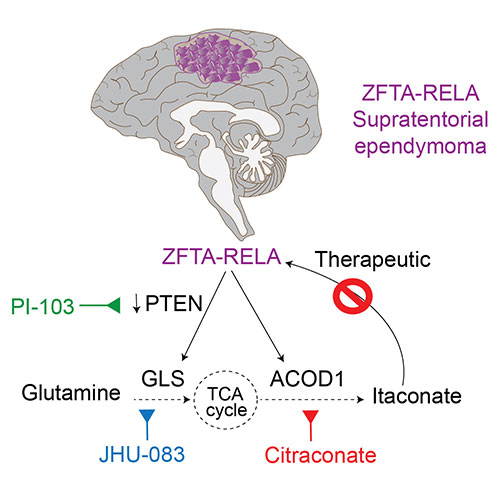










 copy sq 500.jpg)


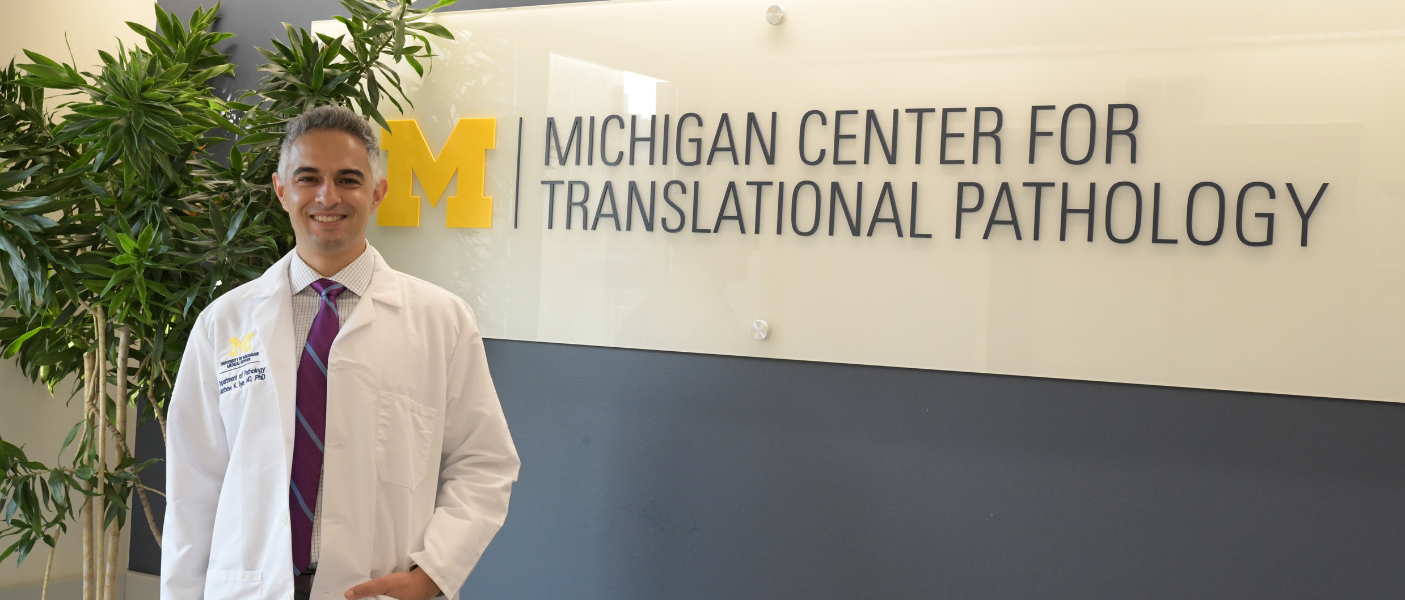


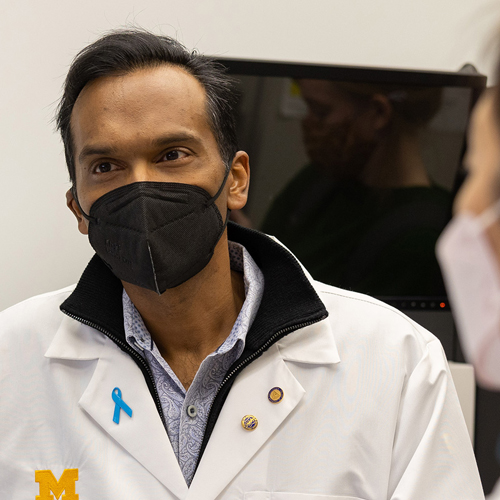







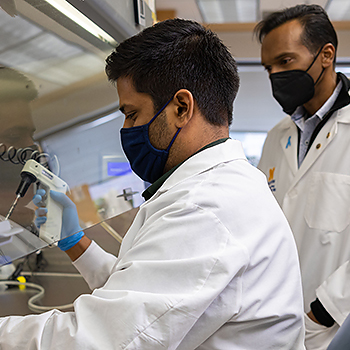







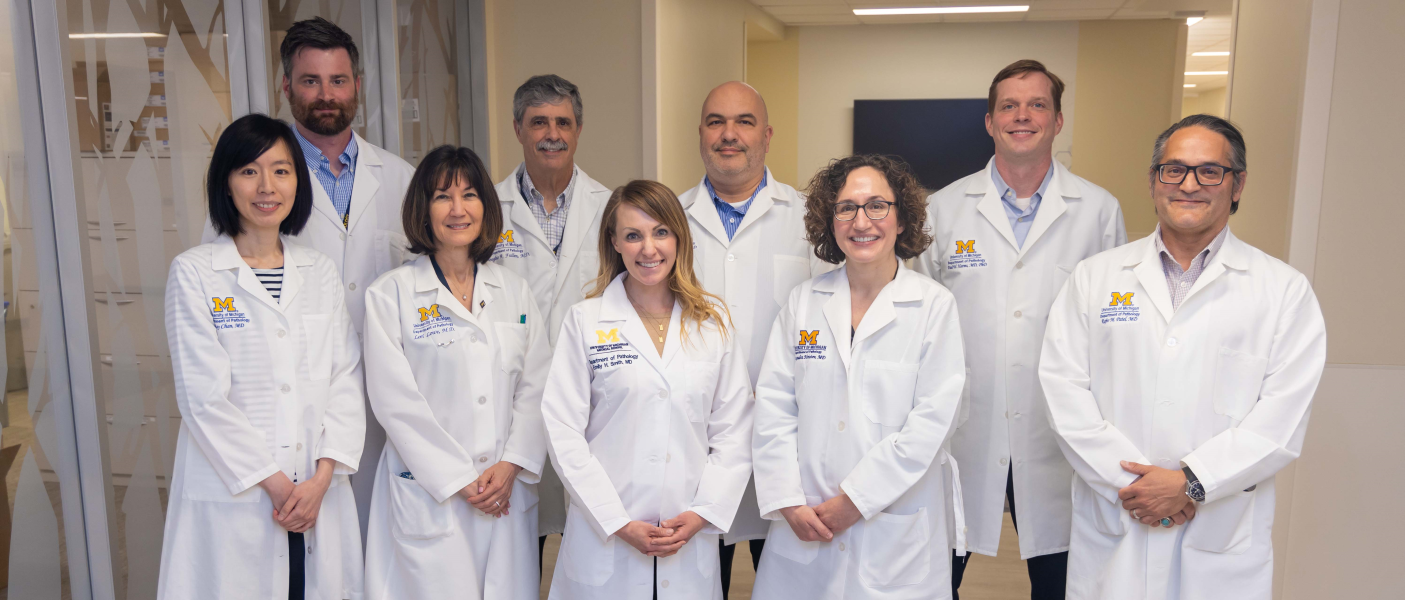
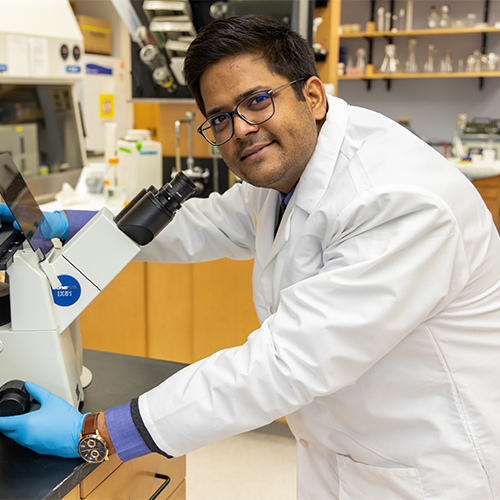



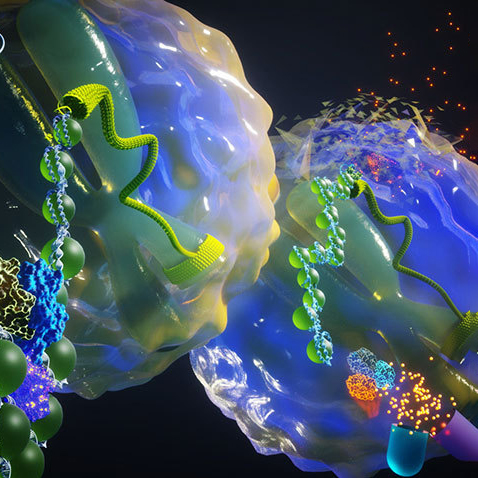


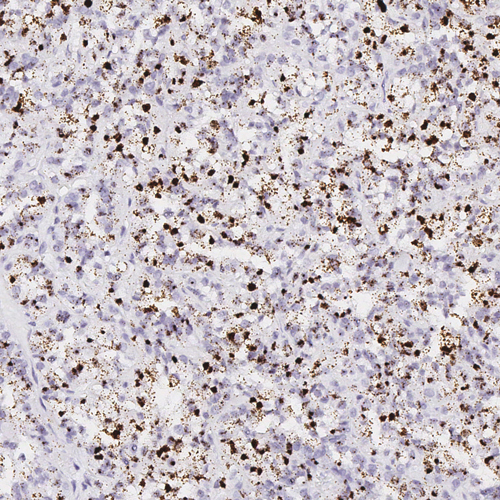
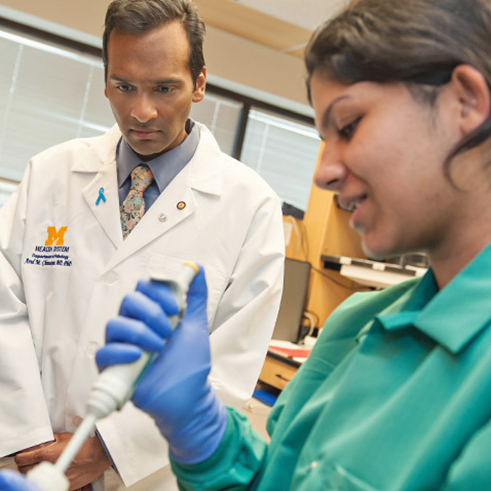
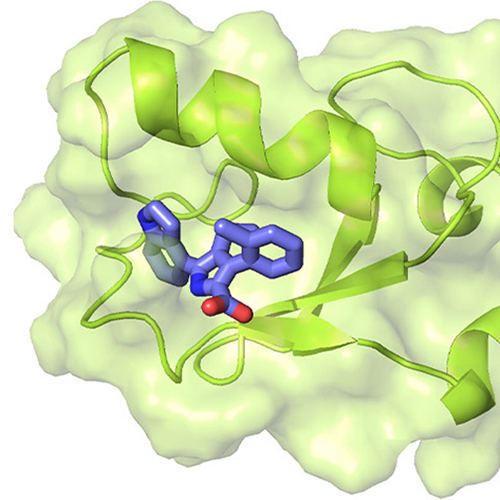
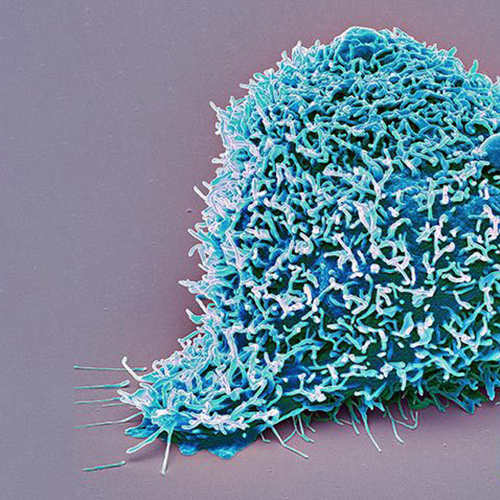
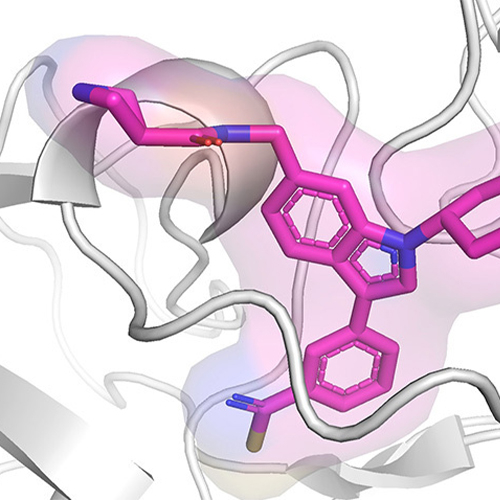

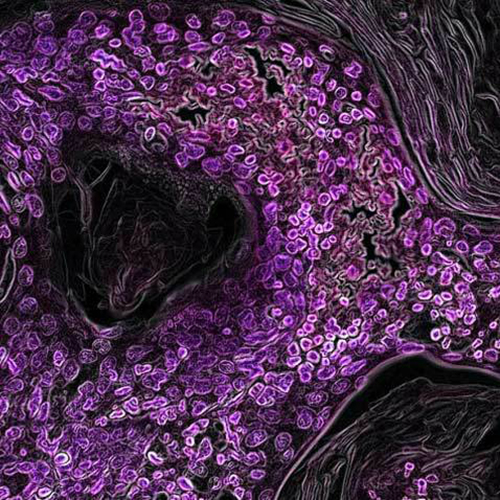


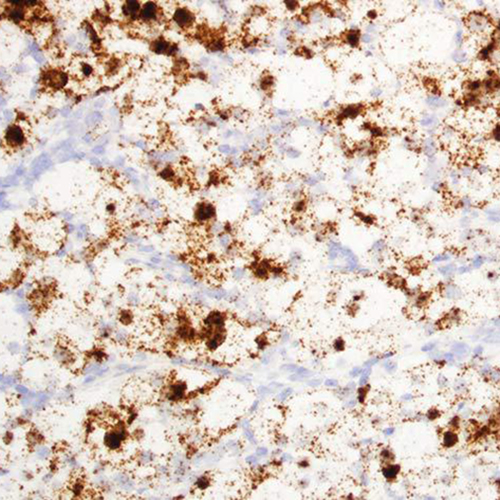
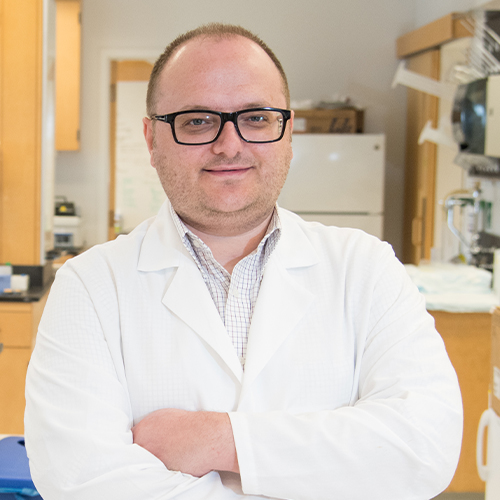
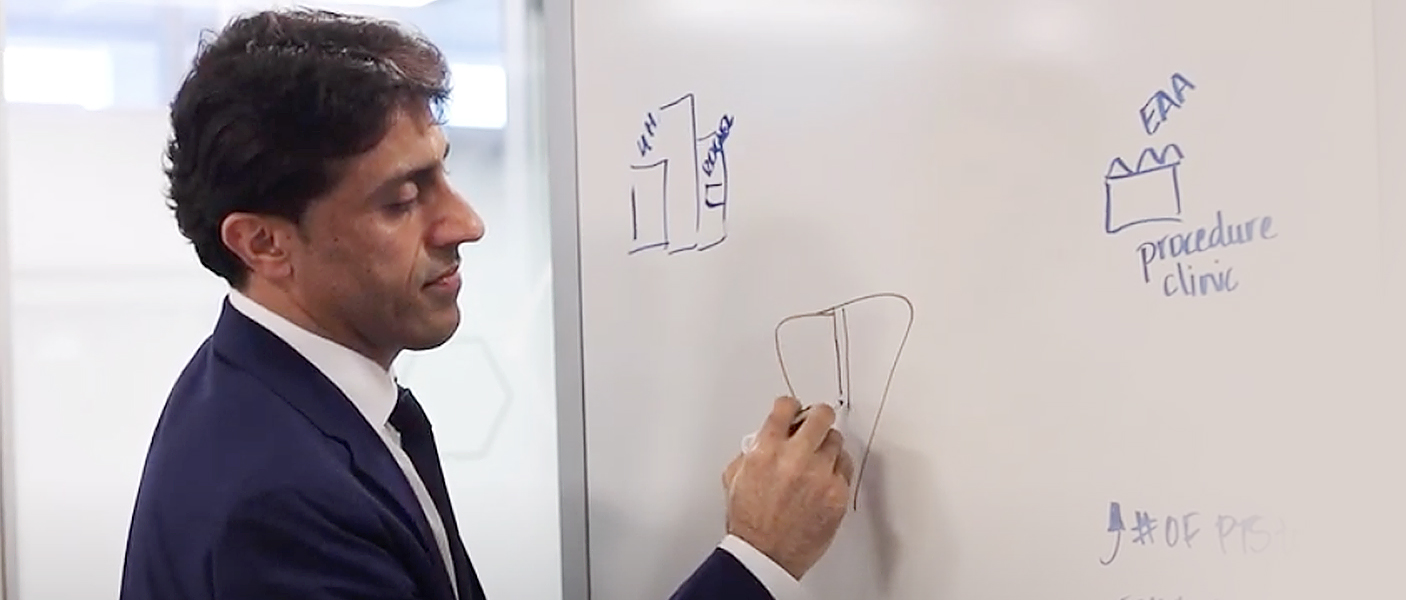


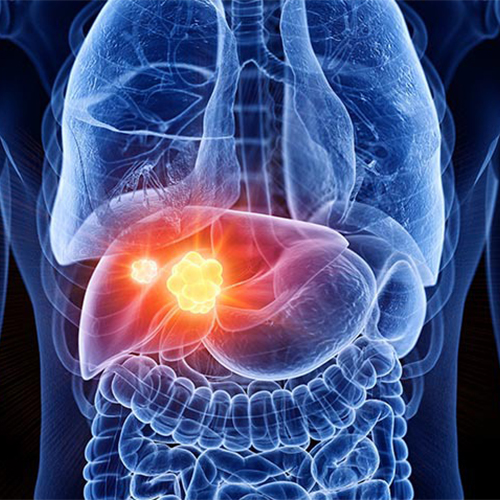
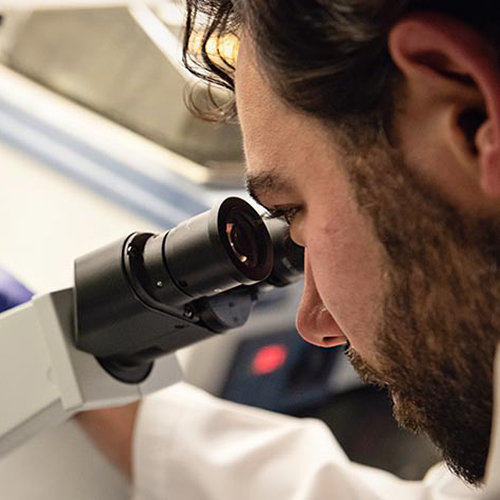
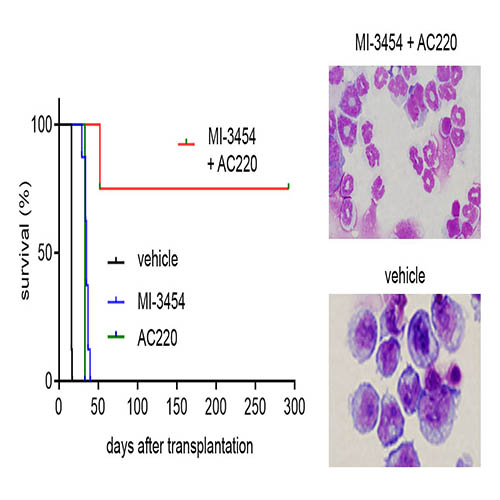
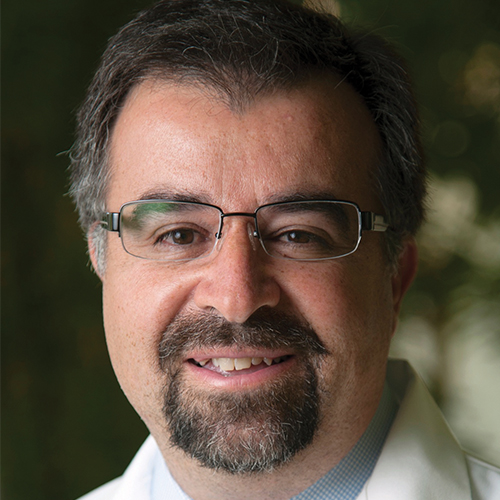



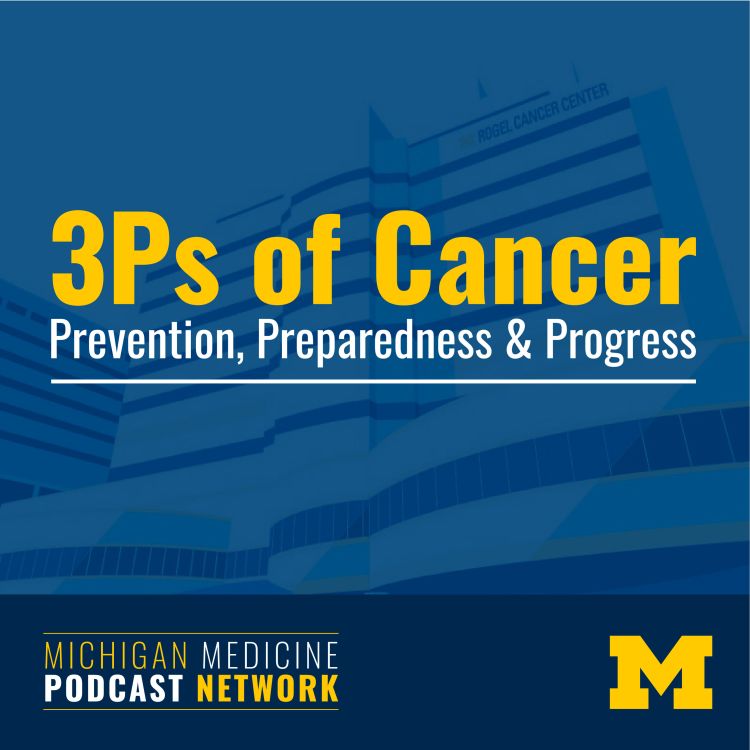
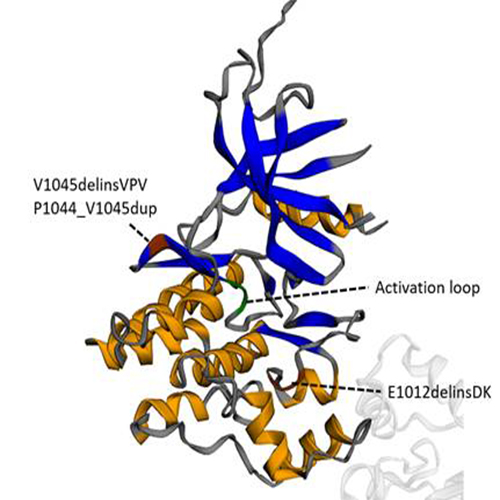

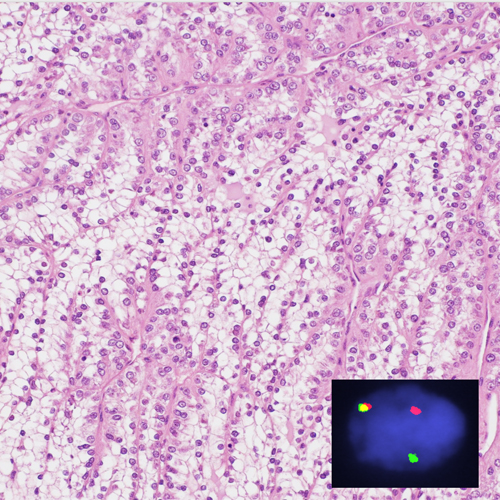
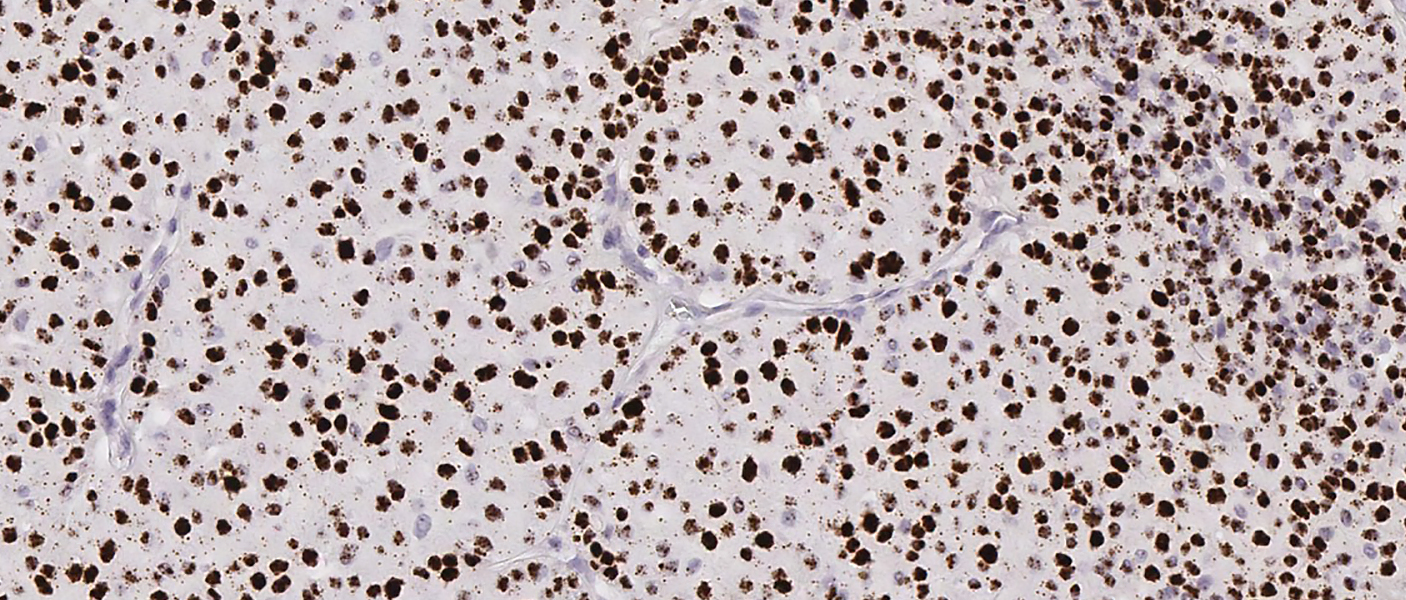
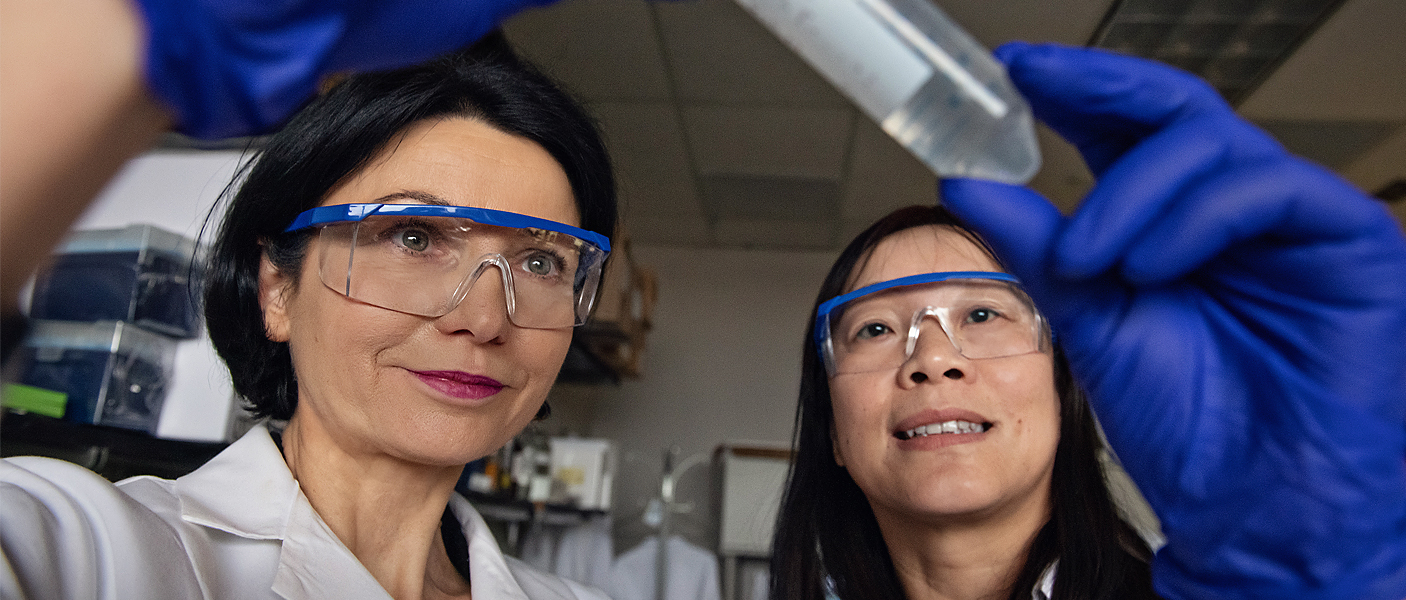


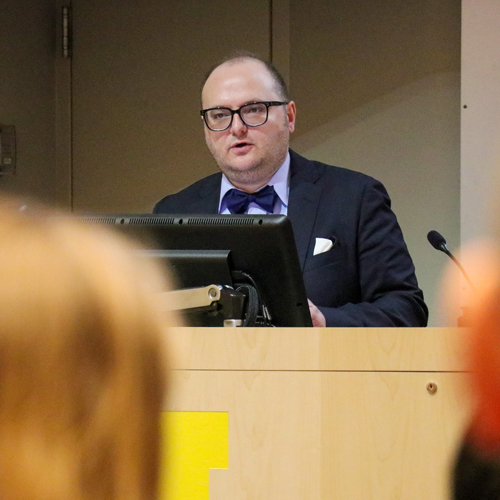

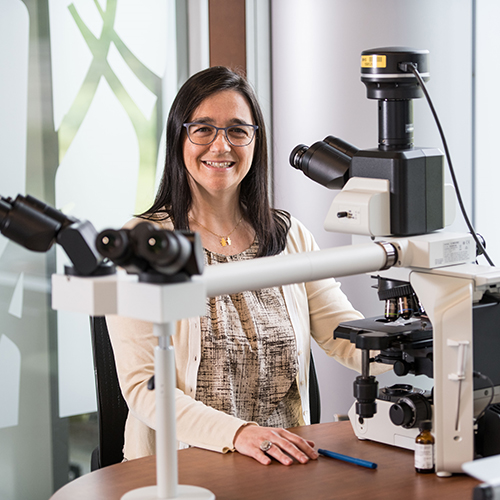


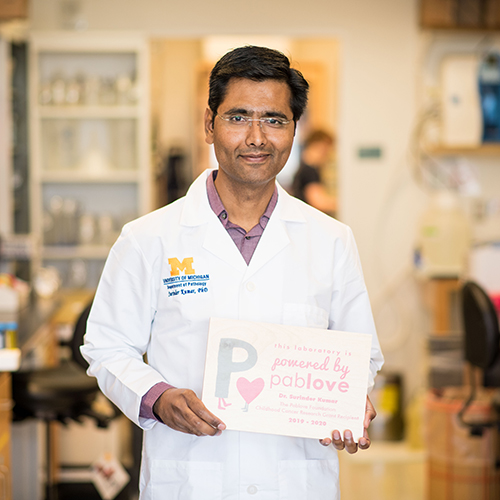

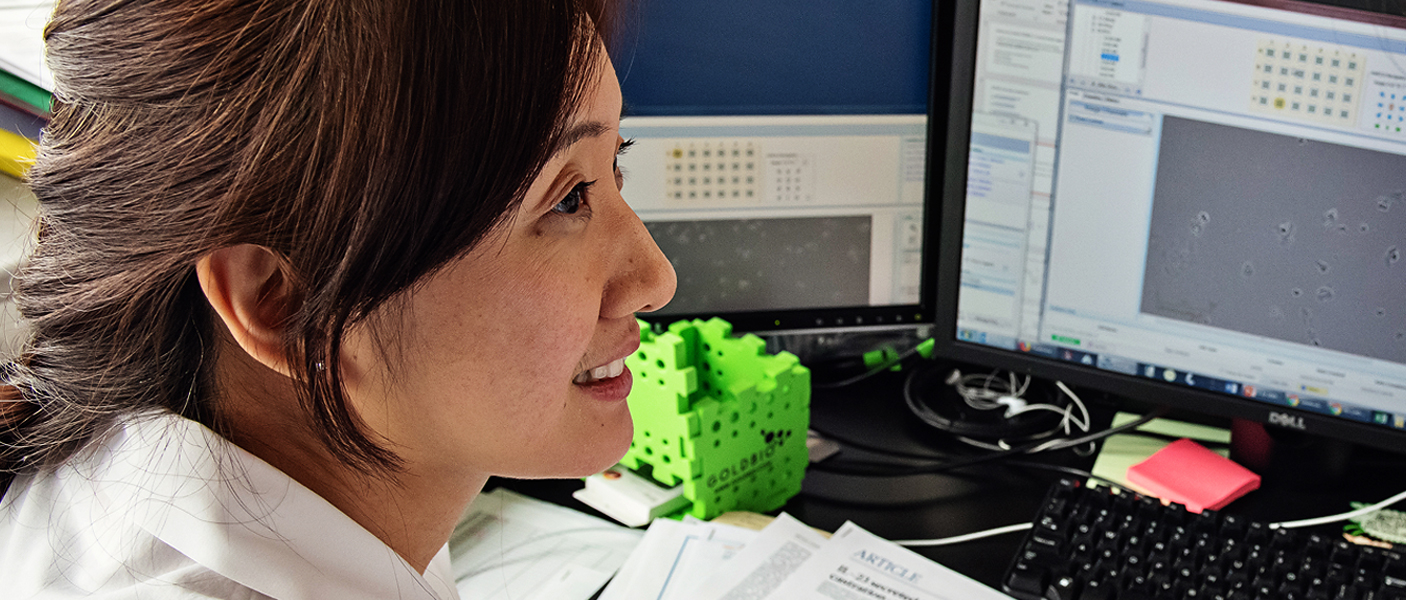
 ON THE COVER
ON THE COVER
 ON THE COVER
ON THE COVER
 ON THE COVER
ON THE COVER
 ON THE COVER
ON THE COVER
 ON THE COVER
ON THE COVER
 ON THE COVER
ON THE COVER
 ON THE COVER
ON THE COVER
 ON THE COVER
ON THE COVER
 ON THE COVER
ON THE COVER
 ON THE COVER
ON THE COVER
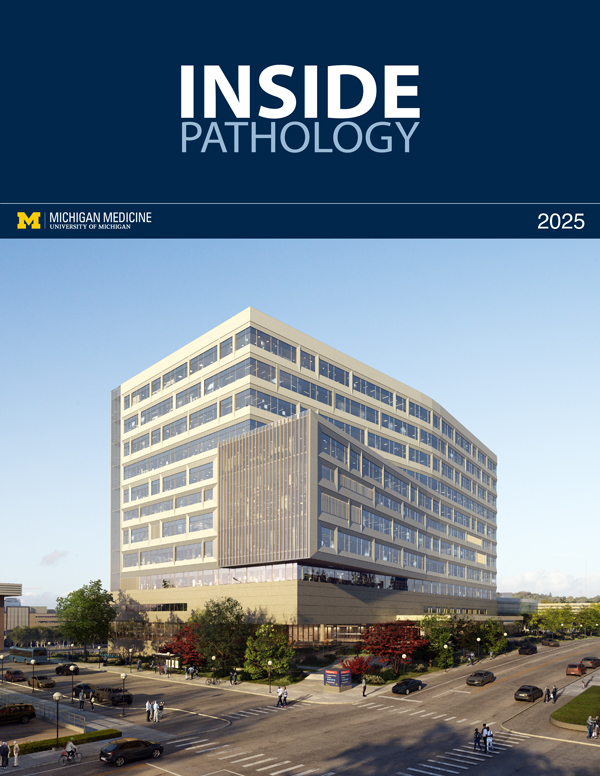 ON THE COVER
ON THE COVER
